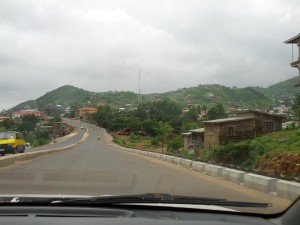When Osgoode Meets Salone

We worked for Defence for Children International – Sierra Leone (DCI) in Freetown, Sierra Leone through Osgoode’s student-run International Legal Partnership (ILP) for ten weeks. We drafted and submitted a constitutional review of the Constitution of Sierra Leone that was submitted to the Constitutional Review Commission of Sierra Leone (CRC). Our report consisted of amendments and their justifications based on comparisons to the constitutions of other African countries, the African Charter, and the UN Convention on Rights of the Child. We also had other assignments that included drafting and amending the constitutions of DCI and the Child Rights Coalition of Sierra Leone, creating memorandums of understanding, completing reports on other DCI initiatives (like the Girl Power Programme), preparing training manuals for social workers, and providing information packets on the justice system that were distributed to juvenile offenders, their families, witnesses, and victims.
Highlight:
ELISE: I held an educational seminar on Sex Education that included a section on consent. The audience consisted of several education facilitators of DCI and other staff that were not involved in the Girl Power Project, which the educational seminar was created for. At first, it was clear that a lot of the staff members did not want to attend. But, after half way through the presentation, everyone was really engaged and asking lots of questions. I felt that I had actually supplied fundamental knowledge on the elements of consent, as well as other important sexual health facts. After my presentation was complete, some of the initially reluctant staff members even came up to me and told me how happy they were that they had stayed and how much they had learned.
ESTHER: One of the many highlights of my internship was my meeting with an internationally-acclaimed human rights lawyer who was the previous director of DCI. He had drafted recommendations for the Sierra Leonean constitution and thus had a lot of insight on our report. The goal for the review was to create a constitutional report that contained realistic recommendations, which were catered to the social dynamic unique to Sierra Leone. As a foreign intern, I talked to my colleagues and local friends about social issues, so I had a general idea of people’s sentiments, but through my meeting I gained a better understanding of the efficacy of our recommendations and the social reality of Sierra Leone. We talked about the history, present, and future of Sierra Leone and what could be done to achieve societal and judicial goals and overcome obstacles through the law. This meeting was an eye-opening encounter that made me more aware of the realities of the political, legal, and social spheres of Sierra Leone and more hopeful for its future growth.
Challenge:
ELISE: The hardest part for me was the disconnection and many, many missed connections from my friends and family. Before arriving in Sierra Leone, I thought that it would be the difference in comforts that would be my greatest challenges. But, by the end, I even came to enjoy bucket showers. However, not being able to communicate or speak with the people that matter most to me all over the world was the hardest and most challenging struggle.
ESTHER: This wasn’t a challenge per se, but an unforeseen cultural difference that I had to adjust to. Coming from a life mainly situated in Toronto, I was used to being independent, engaging in small talk with strangers, and then going about my business. However, Sierra Leonean culture is very engaging, and it is not uncommon for strangers to talk and ask about your families, personal relationships, invite you over to their house and expect you to do the same, and then end the exchange with a hug and warm handshake. This adjustment was an easy feat to overcome as Sierra Leoneans are so friendly, welcoming, and kind. By the end of the trip, every engagement I had, from walking down the street, at the vegetable-stand to everyday taxi rides resulted in excellent conversation and good friends.
Craziest Moment:
ELISE: DCI’s director is a member of the Rotary Club Freetown-Sunset and they were holding a large gala to celebrate their chapter. Our director gave myself and the other two foreign interns tickets for that gala and had us seated at his table. He also invited a few other DCI staff members. After dinner and awards, the gala turned into one huge Sierra Leonean dance party. All of DCI danced together all night long and the best part was dancing to Madonna with my director!
ESTHER: There is never a dull moment in Sierra Leone, but one of the craziest out-of-body experiences I encountered was when I went to Waterloo, a market, taxi drop-off, and poda poda (small bus) terminal all in one. The minute the poda poda entered Waterloo, people would bombard the poda poda, asking the passengers where we were going. When I answered one person of many, he cheered and found me a taxi. I had to wait for six other people so the taxi would be filled to the brim (it was a sedan fit for five though we squeezed in seven), but passed the time amusing children selling snacks in the market with my elementary Krio. I stopped by again, on my way back to Freetown, and took the time to walk through the market/terminal. People yelled pleasantries at me, encouraging me to come into their stalls, perhaps buy something, or just talk for a while. There were so many people that it was hard not to get swept up in one direction when I meant to go another. I tried lots of local snacks, bought beautiful fabrics, and then boarded the poda poda back to Freetown, beside a woman with a live chicken on her lap.
